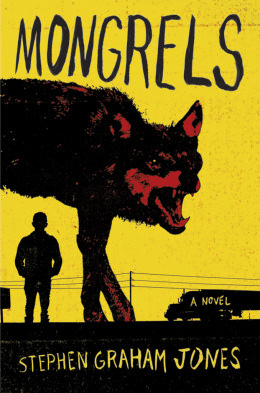Werewolves have a publicity problem; while their place in the pantheon of folklore monsters is just as ancient as vampires, lycanthropes don’t have the same sex appeal as their blood-sucking brethren. Werewolves aren’t fops surrounded by crumbling castles or exclusive nightclubs, werewolves don’t seduce high school girls, don’t fret over their souls, and don’t demure when it comes to taking a meal.
Stephen Graham Jones’ latest novel, Mongrels, makes a meal fit for any werewolf: meaty, surprisingly sweet of heart, and immensely satisfying.
The young, nameless narrator of Mongrels has grown up in a family of real-deal werewolves. His ornery Grandpa tells war stories of werewolves as secret weapons in Vietnam, pack vs. pack violence, and a loss with surprising and tragic implications for his grandson. His father is absent and his mother, like her mother before her, died in childbirth. The teen’s closest approximation to parents are his no-nonsense aunt Libby and Darren, the uncle he idolizes.
Monsters are often a stand-in for underrepresented outsiders and the title of Mongrels is pretty literal. Werewolves, more than other monsters, are part of an ecosystem, a part of society (the fringes of it, anyway) and some are more human than wolf. Some werewolves are more humane, too.
The narrator of Mongrels hasn’t manifested his werewolf traits yet. If he will turn werewolf at all provides the poignant drive of the novel. Will he be like the rest of his family or will he be, in his Aunt Libby’s melancholy, something more than a monster constantly hungry and on the run? Or will he be a wolf in his heart only? To Uncle Darren, hotheaded and proud of his heritage, humans are inherently lesser than werewolves. As time goes on and the narrator’s big change continues to elude him, the narrator feels a growing distance from his uncle and a shame that he might be weak and fang-less forever. This is and is not not your textbook teenage anxiety.
Uncle Darren, with his weakness for drinking strawberry wine coolers and eating the occasional state trooper, is also a real standout here, pure primal urge to Libby’s pragmatic survivalism. Darren reminded me in the best way of another Southern monster antihero: Bill Paxton’s trailer park vampire Severen in 1987’s Near Dark. Mongrels shares a lot with that cinematic vampire clan as Libby, Darren and the narrator are constantly moving across Texas to Arkansas to Florida, knocking off gas stations and working some really odd jobs to keep from getting discovered and/or captured. They’re not always successful. Particularly Darren, whose recklessness leads to some risky escapes and a particularly unfortunate run-in with a bear.
Widely considered one of the most prominent voices in literary horror, Stephen Graham Jones is the author of fifteen novels and over 200 short stories, some most recently collected in After the People Lights have Gone Off. Mongrels is more accessible than a lot of his previous fiction but still showcases clever and engaging narrative choices, particularly when it comes to the extensive examples of werewolf fact versus Hollywood fiction. This is someone who’s given a lot of careful thought to werewolf biology—ask why werewolf women never wear pantyhose—making his monsters all the more plausible and frightening.
Is it supremely corny to say a werewolf novel grabbed me by the throat? Maybe. But Mongrels did and is an early contender for my favorite novel of the year. Its addictive qualities are less about the plot itself, which is sometimes as driftless as its characters, and more in the clear voice of the fourteen-year-old narrator, whose uncertain navigation of adolescence and family plays as real as anything you’d find in S.E. Hinton’s The Outsiders. Only with more teeth.
Mongrels is available May 10th from William Morrow.
Theresa DeLucci is a regular contributor to Tor.com, covering horror, the Weird and TV, including HBO’sGame of Thrones. She’s also discussed entertainment for Boing Boing and Wired.com’s Geek’s Guide to the Galaxy. A student of the 2008 Clarion West Writers’ workshop, her short fiction has appeared in ChiZine. Follow her on Twitter.










